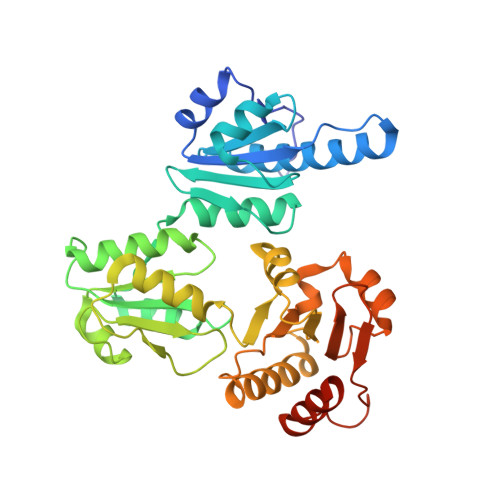Characterization of Post-Translational Modifications to Calsequestrins of Cardiac and Skeletal Muscle.
Lewis, K.M., Munske, G.R., Byrd, S.S., Kang, J., Cho, H.J., Rios, E., Kang, C.(2016) Int J Mol Sci 17
- PubMed: 27649144
- DOI: https://doi.org/10.3390/ijms17091539
- Primary Citation of Related Structures:
5KN0, 5KN1, 5KN2, 5KN3 - PubMed Abstract:
Calsequestrin is glycosylated and phosphorylated during its transit to its final destination in the junctional sarcoplasmic reticulum. To determine the significance and universal profile of these post-translational modifications to mammalian calsequestrin, we characterized, via mass spectrometry, the glycosylation and phosphorylation of skeletal muscle calsequestrin from cattle (B. taurus), lab mice (M. musculus) and lab rats (R. norvegicus) and cardiac muscle calsequestrin from cattle, lab rats and humans. On average, glycosylation of skeletal calsequestrin consisted of two N-acetylglucosamines and one mannose (GlcNAc₂Man₁), while cardiac calsequestrin had five additional mannoses (GlcNAc₂Man₆). Skeletal calsequestrin was not phosphorylated, while the C-terminal tails of cardiac calsequestrin contained between zero to two phosphoryls, indicating that phosphorylation of cardiac calsequestrin may be heterogeneous in vivo. Static light scattering experiments showed that the Ca(2+)-dependent polymerization capabilities of native bovine skeletal calsequestrin are enhanced, relative to the non-glycosylated, recombinant isoform, which our crystallographic studies suggest may be due to glycosylation providing a dynamic "guiderail"-like scaffold for calsequestrin polymerization. Glycosylation likely increases a polymerization/depolymerization response to changing Ca(2+) concentrations, and proper glycosylation, in turn, guarantees both effective Ca(2+) storage/buffering of the sarcoplasmic reticulum and localization of calsequestrin (Casq) at its target site.
Organizational Affiliation:
Department of Chemistry, Washington State University, Pullman, WA 99164, USA. kevin_lewis@wsu.edu.



















